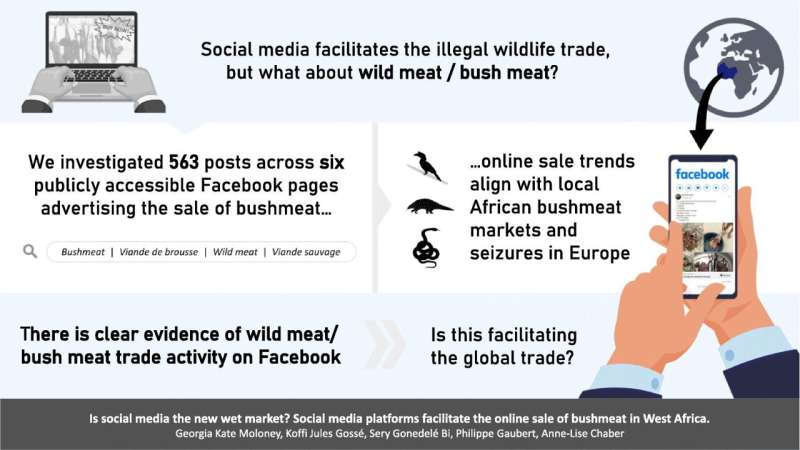This article has been reviewed according to Science X's editorial process and policies. Editors have highlighted the following attributes while ensuring the content's credibility:
fact-checked
proofread
Social media fueling risky bushmeat sales, study finds

The use of social media by West African vendors to promote the illegal sale of bushmeat should be regulated to help prevent the emergence of diseases transmitted from animals to humans, a new study suggests.
The devastation wrought by diseases such as Ebola and COVID-19 has brought into sharp relief the global threat of zoonotic diseases, where the virus jumps from animals to humans.
According to the study published in the June issue of the journal One Health, the growth in wild meat sales advertised via social media could threaten species biodiversity and fuel the spread of such diseases.
"Due to the widespread impacts of social media and evidence of the bushmeat trade in other countries such as in Europe, we wanted to investigate if social media provides a potential link between bushmeat vendors in Africa and consumers in other parts of the world," said Georgia Moloney, lead author of the study and a doctoral candidate at the School of Animal and Veterinary Sciences at the University of Adelaide in Australia.
The researchers analyzed Facebook posts promoting wild meat, published between 2018 and 2022 from five Facebook pages in Côte d'Ivoire and one in Nigeria.
They identified 25 bushmeat species made up of mammals, birds and reptiles. Almost two-thirds of these were advertised as smoked while the others were sold as fresh, cooked or alive.
Five of the six pages directed customers to the end-to-end encrypted private messaging service WhatsApp as the preferred method of communication, according to the study. Alternative channels of communication included sending a private message via Facebook Messenger.
Such strategies, "designed to evade detection," add to the challenges around tracing and regulating the trade, the study said.
Illegal wildlife trade
Moloney told SciDev.Net that they wanted to understand the modern avenues which are being used to promote and sell bushmeat and understand how products are advertised to consumers.
"We used basic descriptors to search for pages advertising bushmeat on Facebook as if we were customers," Moloney said.
"It is clear that [social media platforms] are being used for the illegal wildlife trade despite policies and legislation in place to protect the sale of endangered species."
Early this year, a new bill to combat illegal wildlife trade, the "Endangered Species Conservation and Protection Bill" passed the first reading at the Federal House of Representatives in Nigeria
But Oladosun Abdulmojeed, a bushmeat seller in Ibadan, Nigeria, told SciDev.Net that he advertises bushmeat sales via Facebook and WhatsApp.
"I sell them because people need them, and they should easily find them," explained Abdulmojeed, who has been in the business for more than ten years. "I do not see anything wrong with this trade. The findings of the study indicate that the authors and foreign countries only want to protect their wildlife."
Henry Erikowa, a conservationist and founder of the Coastal and Marine Areas Development Initiative, Nigeria, says that the study's findings highlight how humans are destroying wild animals.
He believes that social media advertising enables anyone to engage in the trade, whether licensed or not. This makes it difficult to know the types of bushmeat exported to countries outside of Africa, he says.
"The authorities should regulate more control on point of entry and exit," Erikowa told SciDev.Net. He added that without sufficient regulation, government loses taxes and endangered species could be traded off without knowing.
"We can work at reducing the occurrence of bushmeat sales but it may not be eliminated," he added.
He acknowledges the challenge of preventing the practice of bushmeat sales but says there needs to be fast-track prosecution processes for violators of trade rules.
More information: Georgia Kate Moloney et al, Is social media the new wet market? Social media platforms facilitate the online sale of bushmeat in West Africa, One Health (2023). DOI: 10.1016/j.onehlt.2023.100503
Provided by SciDev.Net



















